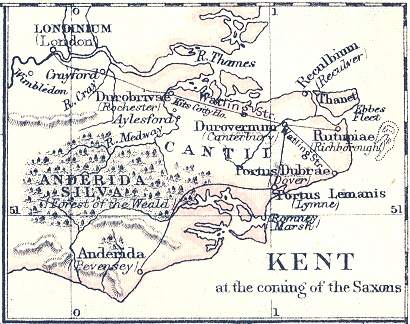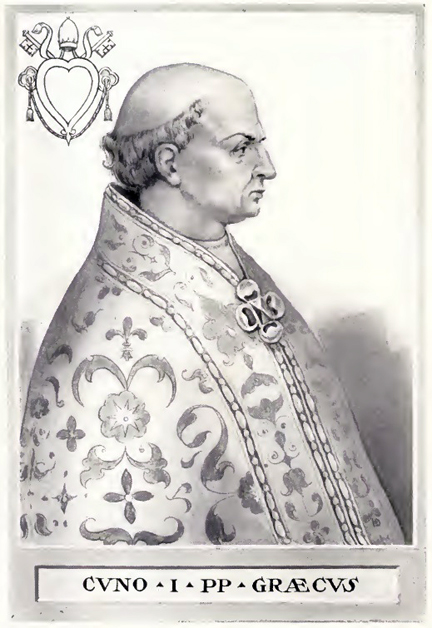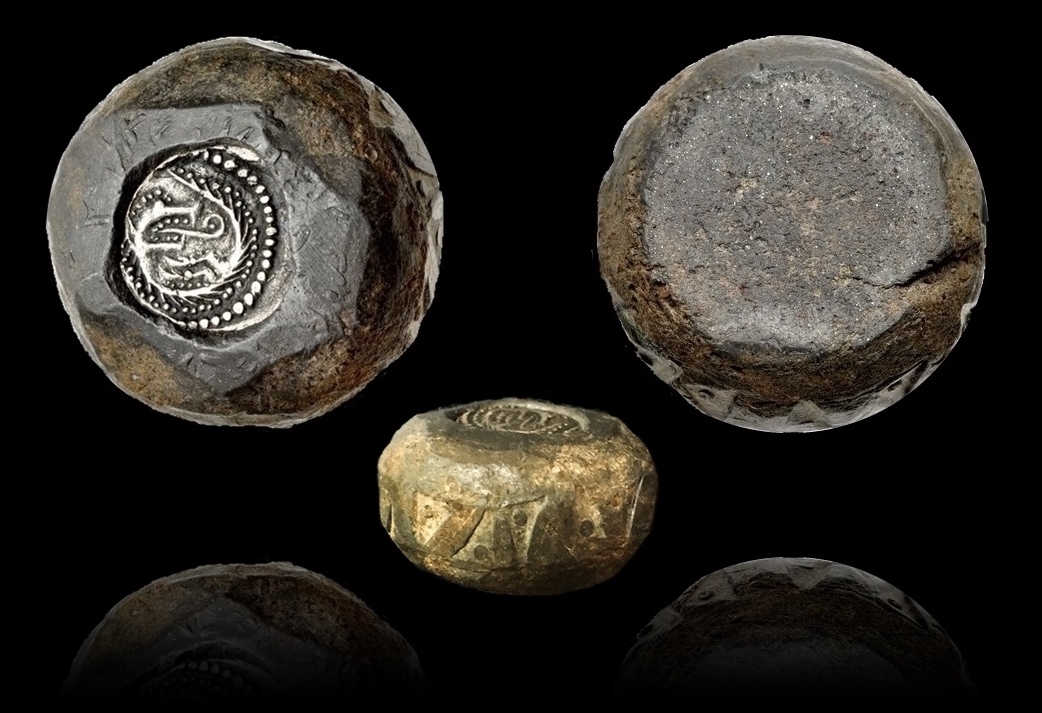|
Eadric Of Kent
Eadric (died August 686/ 687?) was a King of Kent (685–686). He was the son of Ecgberht I. Historical context In the 7th century the Kingdom of Kent had been politically stable for some time. According to Bede: Eorcenberht was succeeded by his sons Ecgberht (664-673) and Hlothhere (673-685). Ecgberht's court seems to have had many diplomatic and ecclesiastic contacts. He hosted Wilfrid and Benedict Biscop, and provided escorts to Archbishop Theodore and Abbot Adrian of Canterbury for their travels in Gaul. However, increasing dynastic tensions occurred at this time, when according to tradition Ecgberht had his cousins Æthelred and Æthelberht murdered, effectively removing them as they had a strong claim on the throne. Joint ruler of Kent? Hlothhere succeeded his brother as ruler of Kent in 673. It was not unusual for Kent to be divided between rulers at that time. However although there has been some suggestion that Eadric jointly ruled with his uncle Hloth ... [...More Info...] [...Related Items...] OR: [Wikipedia] [Google] [Baidu] |
King Of Kent
This is a list of the kings of the Anglo-Saxon Kingdom of Kent. The regnal dates for the earlier kings are known only from Bede. Some kings are known mainly from charters, of which several are forgeries, while others have been subjected to tampering in order to reconcile them with the erroneous king lists of chroniclers, baffled by blanks, and confused by concurrent reigns and kings with similar or identical names. It is commonplace for the later kings to be referred to as subkings, but the actual rank used is always ''rex'', never ''regulus'' (except for a late legend concerning Eormenred). The usual style was simply King of Kent (''rex Cantiae'') or King of the Kentish Men (''rex Cantuariorum''). Territorial division within Kent is not alluded to, except by Eadberht I (''rex Cantuariorum terram dimidii'') and Sigered (''rex dimidie partis prouincie Cantuariorum''). List of kings of Kent See also *List of English monarchs * Kentish Royal Legend *Anglo-Saxon royal genealogi ... [...More Info...] [...Related Items...] OR: [Wikipedia] [Google] [Baidu] |
Isle Of Thanet
The Isle of Thanet () is a peninsula forming the easternmost part of Kent, England. While in the past it was separated from the mainland by the Wantsum Channel, it is no longer an island. Archaeological remains testify to its settlement in ancient times. Today, it is a tourist destination, and has an active agricultural base. Etymology The island of Thanet is mentioned as ''Tonetic'' (c. AD 150; the TON- of this form was misread as TOΛI-, hence it appears as ''Toliatis'' in the surviving manuscripts of Ptolemy); ''Tanat's'', ''Athanatos'' and ''Thanatos'' (in various copies of 3rd C AD, Solinus); ''Tanatos'' (AD 731); ''Tenid'' in 679 and ''Tenet'' (e.g. charters of AD 679, 689 and thereafter); and the Old Welsh forms ''Tanet'' and ''Danet'', found in the ''Historia Brittonum'' (c. AD 829/30) and Armes Prydein (c. AD 930). Standard reference works for English place-names (such as Eilert Ekwall's ''Concise Oxford Dictionary of English Place-Names'') state the name ''Tane ... [...More Info...] [...Related Items...] OR: [Wikipedia] [Google] [Baidu] |
686 Deaths
__NOTOC__ Year 686 ( DCLXXXVI) was a common year starting on Monday of the Julian calendar. The denomination 686 for this year has been used since the early medieval period, when the Anno Domini calendar era became the prevalent method in Europe for naming years. Events By place Europe * Waratton, mayor of the palace of Neustria and Burgundy, dies and is succeeded by his son-in-law Berchar. He advises King Theuderic III to break the peace treaty with Pepin of Herstal, and declares war on Austrasia. Britain * King Cædwalla of Wessex establishes overlordship of Essex, and invades Kent for a second time. King Eadric is expelled, and Cædwalla's brother Mul is installed in his place. The sub-kings Berthun and Andhun are killed, and Sussex is subjugated by the West Saxons. * Cædwalla conquers Surrey, and tries to exterminate the Jutes of the Isle of Wight. He executes King Arwald and his two brothers. Cædwalla probably also overruns the Meonware, a Jutish people ... [...More Info...] [...Related Items...] OR: [Wikipedia] [Google] [Baidu] |
Kentish Monarchs
Kentish may be used as a name: * Kentish Council is a local government area in Tasmania, Australia *Kentish Town is an area of north west London, England Kentish as a surname: * John Kentish (minister), 1768–1853 * John Kentish (tenor), 1910–2006, English opera singer Kentish may also be an adjective for things relating to the English county of Kent or the former Kingdom of Kent The Kingdom of the Kentish (; ), today referred to as the Kingdom of Kent, was an Early Middle Ages, early medieval kingdom in what is now South East England. It existed from either the fifth or the sixth century AD until it was fully absorbed i ...: * Kentish dialect, the dialect of Modern English spoken in Kent * Kentish dialect (Old English), a dialect of Old English * Kentish Man or Maid * Old Kentish Carol, a traditional Christmas carol from Kent See also * Kent (other) * Kentish plover {{disambig ... [...More Info...] [...Related Items...] OR: [Wikipedia] [Google] [Baidu] |
Anglo-Saxon Warriors
The Anglo-Saxons, in some contexts simply called Saxons or the English, were a cultural group who spoke Old English and inhabited much of what is now England and south-eastern Scotland in the Early Middle Ages. They traced their origins to Germanic settlers who became one of the most important cultural groups in Britain by the 5th century. The Anglo-Saxon period in Britain is considered to have started by about 450 and ended in 1066, with the Norman Conquest. Although the details of their early settlement and political development are not clear, by the 8th century an Anglo-Saxon cultural identity which was generally called had developed out of the interaction of these settlers with the existing Romano-British culture. By 1066, most of the people of what is now England spoke Old English, and were considered English. Viking and Norman invasions changed the politics and culture of England significantly, but the overarching Anglo-Saxon identity evolved and remained dominant even ... [...More Info...] [...Related Items...] OR: [Wikipedia] [Google] [Baidu] |
List Of Monarchs Of Kent
This is a list of the kings of the Anglo-Saxon Kingdom of Kent. The regnal dates for the earlier kings are known only from Bede. Some kings are known mainly from charters, of which several are forgeries, while others have been subjected to tampering in order to reconcile them with the erroneous king lists of chroniclers, baffled by blanks, and confused by concurrent reigns and kings with similar or identical names. It is commonplace for the later kings to be referred to as subkings, but the actual rank used is always ''rex'', never ''regulus'' (except for a late legend concerning Eormenred). The usual style was simply King of Kent (''rex Cantiae'') or King of the Kentish Men (''rex Cantuariorum''). Territorial division within Kent is not alluded to, except by Eadberht I (''rex Cantuariorum terram dimidii'') and Sigered (''rex dimidie partis prouincie Cantuariorum''). List of kings of Kent See also *List of English monarchs * Kentish Royal Legend * Anglo-Saxon royal genealog ... [...More Info...] [...Related Items...] OR: [Wikipedia] [Google] [Baidu] |
Mul Of Kent
Mul (, literally "mule") (died 687) was an Anglo-Saxons, Anglo-Saxon ruler of the Kingdom of Kent in England. Biography The name Mul is very unusual and it has been postulated that it derives from the Latin ''mulus'' meaning mule, a word which is known to have entered the Old English vocabulary; presumably it was a nickname which became habitual. Mul's father was Coenberht, making him a member of the House of Wessex (a descendant of Cynric of Wessex, Cynric) and his brother was Caedwalla of Wessex. Mul is described as briefly ruling as King of the Kingdom of Kent following its conquest by Caedwalla in 686. The ''Anglo-Saxon Chronicle'' relates that in 686, "Caedwalla and Mul, his brother, ravaged Kent and Isle of Wight, Wight." Mul's reign is also mentioned in a charter of the later king Swæfheard. Death Mul seems to have only ruled a year before the local population rose up in revolt against him in 687, chasing him and his followers into a building near the local church and ... [...More Info...] [...Related Items...] OR: [Wikipedia] [Google] [Baidu] |
William Of Malmesbury
William of Malmesbury (; ) was the foremost English historian of the 12th century. He has been ranked among the most talented English historians since Bede. Modern historian C. Warren Hollister described him as "a gifted historical scholar and an omnivorous reader, impressively well versed in the literature of Classical antiquity, classical, patristic, and earlier medieval times as well as in the writings of his own contemporaries. Indeed William may well have been the most learned man in twelfth-century Western Europe." William was born about 1095 or 1096 in Wiltshire, England. His father was Normans, Norman and his mother English. He spent his whole life in England and his adult life as a monk at Malmesbury Abbey in Wiltshire. Biography Though the education William received at Malmesbury Abbey included a smattering of logic and physics, moral philosophy and history were the subjects to which he devoted the most attention. The earliest fact which he records of his career is tha ... [...More Info...] [...Related Items...] OR: [Wikipedia] [Google] [Baidu] |
Cædwalla Of Wessex
Cædwalla (; 659 – 20 April 689) was the King of Wessex from approximately 685 until he abdicated in 688. His name is derived from the Welsh Cadwallon. He was exiled from Wessex as a youth and during this period gathered forces and attacked the South Saxons, killing their king, Æthelwealh, in what is now Sussex. Cædwalla was unable to hold the South Saxon territory, however, and was driven out by Æthelwealh's ealdormen. In either 685 or 686, he became King of Wessex. He may have been involved in suppressing rival dynasties at this time, as an early source records that Wessex was ruled by underkings until Cædwalla. After his accession, Cædwalla returned to Sussex and won the territory again. He also conquered the Isle of Wight, gained control of Surrey and the kingdom of Kent, and in 686 he installed his brother Mul as king of Kent. Mul was burned in a Kentish revolt a year later, and Cædwalla returned, possibly ruling Kent directly for a period. Cædwalla was wo ... [...More Info...] [...Related Items...] OR: [Wikipedia] [Google] [Baidu] |
Wessex
The Kingdom of the West Saxons, also known as the Kingdom of Wessex, was an Anglo-Saxon Heptarchy, kingdom in the south of Great Britain, from around 519 until Alfred the Great declared himself as King of the Anglo-Saxons in 886. The Anglo-Saxons believed that Wessex was founded by Cerdic and Cynric of the Gewisse, though this is considered by some to be a legend. The two main sources for the history of Wessex are the West Saxon Genealogical Regnal List and the ''Anglo-Saxon Chronicle'' (the latter of which drew on and adapted an early version of the List), which sometimes conflict. Wessex became a Christianity, Christian kingdom after Cenwalh () was baptised and was expanded under his rule. Cædwalla later conquered Kingdom of Sussex, Sussex, Kingdom of Kent, Kent and the Isle of Wight. His successor, Ine of Wessex, Ine (), issued one of the oldest surviving English law codes and established a second West Saxon bishopric. The throne subsequently passed to a series of kings wit ... [...More Info...] [...Related Items...] OR: [Wikipedia] [Google] [Baidu] |
Coup D'état
A coup d'état (; ; ), or simply a coup , is typically an illegal and overt attempt by a military organization or other government elites to unseat an incumbent leadership. A self-coup is said to take place when a leader, having come to power through legal means, tries to stay in power through illegal means. By one estimate, there were 457 coup attempts from 1950 to 2010, half of which were successful. Most coup attempts occurred in the mid-1960s, but there were also large numbers of coup attempts in the mid-1970s and the early 1990s. Coups occurring in the post-Cold War period have been more likely to result in democratic systems than Cold War coups, though coups still mostly perpetuate authoritarianism. Many factors may lead to the occurrence of a coup, as well as determine the success or failure of a coup. Once a coup is underway, coup success is driven by coup-makers' ability to get others to believe that the coup attempt will be successful. The number of successful cou ... [...More Info...] [...Related Items...] OR: [Wikipedia] [Google] [Baidu] |
Wulfhere Of Mercia
Wulfhere or Wulfar (died 675) was King of Mercia from 658 until 675 AD. He was the first Christian king of all of Mercia, though it is not known when or how he converted from Anglo-Saxon paganism. His accession marked the end of Oswiu of Northumbria's overlordship of southern England, and Wulfhere extended his influence over much of that region. His campaigns against the West Saxons led to Mercian Supremacy, Mercian control of much of the Thames valley. He conquered the Isle of Wight and the River Meon, Meon valley and gave them to King Æthelwealh of Sussex, Æthelwealh of the South Saxons. He also had influence in Surrey, Kingdom of Essex, Essex, and Kingdom of Kent, Kent. He married Ermenilda of Ely, Eormenhild, the daughter of King Eorcenberht of Kent. Wulfhere's father, Penda of Mercia, Penda, was killed in 655 at the Battle of Winwaed, fighting against Oswiu of Northumbria. Penda's son Peada of Mercia, Peada became king under Oswiu's overlordship but was murdered six mont ... [...More Info...] [...Related Items...] OR: [Wikipedia] [Google] [Baidu] |





